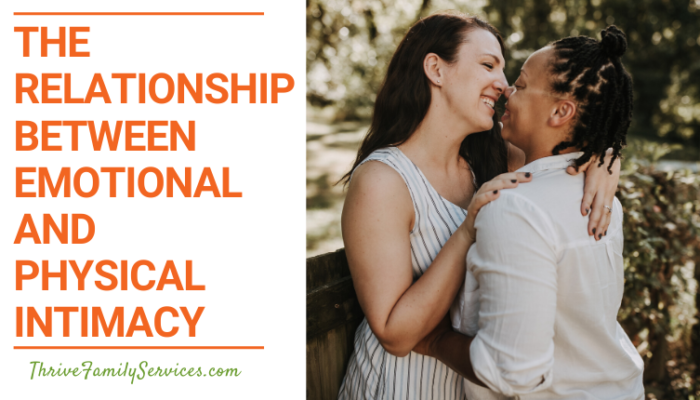What Do Emotional and Physical Intimacy Have To Do With Each Other?
So many couples struggle to understand how to “spice up” their sex life. Other couples experience fluctuations in the quality of their sex life that feel hard to predict. Sometimes, the physical intimacy between partners is so strong, and other times, it feels difficult for those same partners to connect physically!
Why is that the case?
The answer lies in the relationship between emotional and physical intimacy. Emotional intimacy plays a huge role in the quality of physical intimacy between romantic partners. Even innately, many partners will seek physical intimacy as a way to improve feelings of emotional closeness with each other. Other times, partners realize that increasing the quality of their emotional intimacy has its rewards in the bedroom.
Let’s start with the basics:
For the purpose of this blog, “emotional intimacy” refers to the ability to be emotionally transparent and open. That could mean being able to freely express feelings of appreciation, insecurities, dreams, failures, fears, and embarrassments. It isn’t surprising that this level of emotional openness requires a high level of vulnerability that can feel uncomfortable and exposing to most people.
“Physical intimacy” can be defined as the ability to build connection and closeness sexually. It requires attraction, mutual enjoyment, affection, and yes – vulnerability.
You might be confused at the thought of physical intimacy involving vulnerability. If so, you’re not alone. Let me explain:
In order to have true physical intimacy that builds connection and closeness, there is an element of trust involved. You are, of course, exposing yourself physically. But you are also exposing yourself emotionally to create true physical intimacy with your partner. In other words, to fully enjoy sex, you have to let your guard down. You are opening yourself up to acceptance, safety, and trust – but you are also opening yourself up for criticism, harm, and judgement.
This can be most easily understood by reflecting on the times when you’ve had the best sex with your partner. For most people, it happened at a time of high levels of emotional connection. Maybe it was on your wedding night, maybe it was after a great date, or maybe it was after an intense emotional exchange!
This is because when a person becomes significant to you, then the state of your relationship with that person increasingly matters to you.
A high level of emotional vulnerability requires trust. The more trust you have in your relationship, the easier it gets to be vulnerable in other parts of your relationship – like sex.
Therefore, the more trust that a couple can build through emotional intimacy, the more they can take their guard down to enjoy the benefits of physical intimacy and feel safer to take more risks with each other.
On the flip side of this, it also explains why betrayals in emotional trust between partners can have a negative impact on levels of physical intimacy. When you lose trust with someone, it can negatively impact the level of emotional safety that you feel in the relationship.
Let’s dive in deeper.
I Understand that Stress Is Not a Friend of Physical Intimacy… But What Is the Relationship Between My Stress and My Sex Drive?
Stress is an emotion that activates our brains and our bodies in response to a perceived threat. And it just so turns out that stress (and stressful emotions like fear, mistrust, etc.) is a big libido buzzkill.
But why is that the case?
Our brains are trained to be on the lookout for potential threats in our environment to keep us safe. Our brains are scanning for reasons why we might need to jump into self-protection mode. So when our brain picks up on something potentially harmful and when we have a physiological reaction to that realization, we are experiencing “stress.” And it just so happens that part of that physiological reaction involves the production of hormones like epinephrine and cortisol, which actually decrease a person’s sex drive when produced at high levels.
The state of stress is just not conducive to having sex.
After all, there’s a reason that zebras don’t mate with each other when they are in front of a lion! The context that a human being is in is so, so important when it comes to having and enjoying sex. Some contexts have something in the physical world going on that lead us to the conclusion that now would not be a good time to have sex, therefore making it much harder to enjoy it. For example, like knowing your kids are on the other side of the door or hearing a stranger break into your house. Some contexts have something emotional going on that lead us the conclusion that sex doesn’t feel like a desirable idea. An example of this is the end of a seventy-hour work week or thinking of your partner with their affair partner.
Living things need to be able to complete the stress cycle to be able to see an increased desire + want to connect sexually. Get the burglar out of the house, repair the trust in your marriage… whatever it is that will make your context feel safe again to connect sexually. In order to have great physical intimacy, you will need to know that your environment is safe from threats – and that can definitely include threatening emotions.
It Sounds Like You’re Saying That if I Want to Improve My Physical Intimacy Then I Need to Make My Environment Safe By Completing the Stress Cycle… What Is The Stress Cycle?
The stress cycle has a beginning, middle, and end. The beginning is the recognition of the threat. The middle is the action to get out of harm’s way. The end is the realization of safety. Let’s break this down further:
The stress cycle starts with, of course, something stressful. The stressor can be something universally stressful (like your well-being or your relationship feeling threatened) or it can be something that is stressful in specific contexts (think similarly to how tickling is funny in some contexts and not in others). Regardless of what the stressor is, if your brain determines that this environmental or emotional cue is “not good,” the stress cycle has started.
In this example, let’s say that the stress cycle started because there is a tornado heading towards you.
Once the stress cycle has started, then there is some sort of action to get out of harm’s way. When we see or feel a threat in our world, we have three options in how to respond – we can fight, flee, or freeze. Fighting happens when you determine that there’s something you can do to stop the threat. Fleeing happens when you determine that your best course of action is just to get away from the threat. Freezing happens when you determine that there’s nothing you can do and just accept your fate in an attempt to not make it worse for yourself.
- In our example, “fighting” might mean that you get your loved ones and bunker down in the basement through the storm.
- “Fleeing” might mean that you get in your car and drive away from the tornado as fast as possible.
- Or “freezing” might mean that you just give into your fate and wait for the tornado to come.
Usually, the middle part of the stress cycle is instinctual and not something that you think about. Pretty quickly in the face of stress, people make the determination if they are going to fight, flee, or freeze.
The middle part of the stress cycle can feel a little more complicated when it comes to emotional threats.
Let’s say you and your partner decided to get pregnant for the first time – exciting! However, you are still pretty scared of the thought of becoming a parent. Now, whenever you and your partner get physically intimate, you realize that it isn’t as enjoyable.
This happens because your brain is saying, “Having sex means you are more likely to actually become a parent, and that’s terrifying!” This is enough of a perceived threat to start the stress cycle, and once it has started, it needs to be completed to not let stress be the block that keeps you from quality physical intimacy.
This leads to the last phase of the stress cycle, which is the end of it. The stress cycle is completed when the perceived stressor is no longer there – or no longer perceived to be threatening. For environmental stressors, like the tornado, the stress cycle can end when the storm has passed and you realize everyone and everything is okay. For emotional stressors, like fears of becoming a new parent, it can be a little harder to know when the stress is over.
This is where emotional intimacy can be the key to helping partners complete the stress cycle and improve their physical intimacy.
But Before We Get There…Why Can Unspoken Emotions Between Partners Lead to Built-Up Stress?
Everyone in the world experiences emotions. Everyone. Some feel really good to express freely, like excitement. Others feel a lot more vulnerable to share, like fear.
But what happens when we keep these emotions to ourselves? One thing is for sure: emotions don’t go away when you keep them inside. Instead, built-up emotions are incredibly stressful on the body and mind. In fact, unresolved emotions can actually keep you in the stress cycle. It never ends. This leads to chronic stress since you are never feeling, showing, or resolving your emotions. Even your body starts to feel the impact of unspoken emotions over time, leading to headaches, ulcers, tight muscles, and high blood pressure.
- If you aren’t telling your partner about your stressful day at work because you are worried about burdening him or her, you are keeping yourself in the stress cycle.
- If you aren’t telling your partner that you are scared to become a new parent because you worry they will think you don’t want kids, you are keeping yourself in the stress cycle.
- Or, if you are telling your partner but it leads to you and your partner getting pulled into your negative cycle, you still aren’t completing the stress cycle.
In order to have more and better sex, you have to reduce your stress levels. In order to reduce your stress levels, you have to complete the stress cycle. And, in order to complete the stress cycle, you have to have high levels of emotional intimacy with your partner.
Come As You Are is a book by Emily Nagoski that elaborates on this concept further, and it can be a great resource for learning more about the stress cycle and its relationship with physical intimacy.
I Need to Reduce My Stress Levels Through Emotional Intimacy… Got it! So How Do I Do That?
In order to build emotional intimacy, you have to get vulnerable with yourself and with your partner. Take risks and open up about your emotional experiences with your partner. If this is too hard, start by picking just one area of your life to start practicing vulnerability. Start a soft conversation with your partner to ask about their experience with emotional intimacy in the relationship. Or start working with a couples therapist to de-escalate your negative cycle!
With all of this in mind, it is not too surprising that so many successful relationships in the world started by being good friends! Being able to talk to your partner about your stress, your fears, your vulnerabilities – and seeing that those emotions are landing in a safe and comfortable space – is one of the best ways to start seeing improvement in your physical intimacy!
After all, it’s not just about completing the stress cycle. It’s also about starting to see your partner as someone that you can trust and be vulnerable with. Improving emotional intimacy is a great way to improve the quality of physical intimacy in your relationship.
If you need help repairing the emotional intimacy in your relationship, our Greenwood Village Couples Counselors can help!




